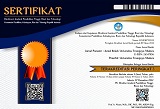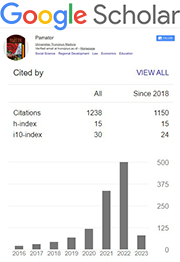Does P2P Lending Have an Impact on Regional Economic Growth? Evidence from Java Provinces
Abstract
Keywords
Full Text:
PDFReferences
Aftech. (2021). Annual Members Survey. Asosiasi Fintech Indonesia.
Arner, D. W., Barberis, J. N., & Buckley, R. P. (2019). The Evolution of Fintech: A New Post-Crisis Paradigm? SSRN Electronic Journal, 1(2), 274–282. https://doi.org/10.2139/ssrn.2676553
Atkeson, A. (2020). What Will Be the Economic Impact of COVID-19 in the US? Rough Estimates of Disease Scenarios. National Bureau of Economic Research Working Paper Series, 53(9), 1689–1699. https://doi.org/10.3386/w26867
Bank Indonesia. (2017). Bank Indonesia Regulation Number 19/12/PBI/2017 On The Implementation Of Financial Technology (Issue 19, pp. 1–14). Bank Indonesia.
Béké, G., & Kézdi, G. (2021). Data Analysis For Business, Economics, And Policy. Cambridge University Press. https://doi.org/10.1017/9781108591102
Dialysa, F. (2019). Synchronize Fintech And The Banking Industry. International Journal of Advanced Research in Technology and Innovation, 1(2), 18–25.
Fabe, A. P., Toledo, J. A., & Laksmi, S. (2022). The Growth of Financial Technology in Indonesia: Implications for Terrorism Financing. International Annals of Criminology, 60(2), 162–181. https://doi.org/10.1017/cri.2022.16
Garcia-Escribano, M., & Han, F. (2015). Credit Expansion in Emerging Markets: Propeller of Growth? IMF Working Papers, 15(212), 24. https://doi.org/10.5089/9781513581927.001
Ho, S. H., & Saadaoui, J. (2022). Bank credit and economic growth: A dynamic threshold panel model for ASEAN countries. International Economics, 170, 115–128. https://doi.org/10.1016/j.inteco.2022.03.001
Hodula, M. (2022). Fintech credit, big tech credit and income inequality. Finance Research Letters, 51, 103387. https://doi.org/10.1016/j.frl.2022.103387
Hongmin, G. A. O., & Gang, L. I. (2022). Fintech, Digital Currency, and the Restructuring of the Global Financial System. China Economic Transition (CET), 5(2), 262–276. https://doi.org/10.3868/s060-014-022-0013-5
Hootsuite, & We Are Social. (2022). The Digital 2022 Global Overview Report. Hootsuite.
INDEF. (2019). Studi Dampak Fintech P2P Lending terhadap Perekonomian Nasional. Institute for Development of Economics and Finance.
Kaur, S. J., Ali, L., Hassan, M. K., & Al-Emran, M. (2021). Adoption of digital banking channels in an emerging economy: exploring the role of in-branch efforts. Journal of Financial Services Marketing, 26, 107–121. https://doi.org/10.1057/s41264-020-00082-w
Lee, J., Wewege, L., & Thomsett, M. C. (2020). Disruptions and Digital Banking Trends. Journal of Applied Finance & Banking, 10(6), 15–56.
Mursitama, T. N., Karim, M. F., Natanael, K. A. C., Setiadi, N. J., Husodo, Z. A., Mukhtar, S., & Noerlina. (2023). Developmental state and digital infrastructure: The case of Indonesia. AIP Conference Proceedings, 2594(1), 100013. https://doi.org/10.1063/5.0109898
Nuryakin, C., Aisha, L., & Massie, N. W. G. (2019). Financial Technology in Indonesia: A Fragmented Instrument for Financial Inclusion? LPEM-FEB UI Working Paper 036, May, 1–9.
Oh, E. Y., & Rosenkranz, P. (2022). Determinants of Peer-to-Peer Lending Expansion: The Roles of Financial Development and Financial Literacy. The Journal of FinTech, 2(1). https://doi.org/10.1142/S2705109922500018
OJK. (2019). Potensi Pertumbuhan Ekonomi ditinjau dari Penyaluran Kredit Perbankan Kepada Sektor Prioritas Ekonomi Pemerintah. In Otoritas Jasa Keuangan (p. 58).
Pu, R., Teresiene, D., Pieczulis, I., Kong, J., & Yue, X. G. (2021). The interaction between banking sector and financial technology companies: Qualitative assessment—a case of lithuania. Risks, 9(1), 1–22. https://doi.org/10.3390/risks9010021
Sari, I. Z., & Falianty, T. A. (2021). Financial Inclusion and Income Inequality: Does Financial Structure Matter? Jurnal Ekonomi Dan Kebijakan Pembangunan, 10(1), 72–100. https://doi.org/10.29244/jekp.10.1.2021.72-100
Siste, K., Hanafi, E., Sen, L. T., Murtani, B. J., Christian, H., Limawan, A. P., Siswidiani, L. P., & Adrian. (2021). Implications of COVID-19 and Lockdown on Internet Addiction Among Adolescents: Data From a Developing Country. Frontiers in Psychiatry, 12, 665675. https://doi.org/10.3389/fpsyt.2021.665675
Slesman, L., Baharumshah, A. Z., & Azman-Saini, W. N. W. (2019). Political institutions and finance-growth nexus in emerging markets and developing countries: A tale of one threshold. Quarterly Review of Economics and Finance, 72, 80–100. https://doi.org/10.1016/j.qref.2019.01.017
Suryahadi, A., Izzati, R. Al, & Suryadarma, D. (2020). The Impact of COVID-19 Outbreak on Poverty: An Estimation for Indonesia. In SMERU Working Paper (pp. 1–20). The SMERU Research Institute.
Syarizka, D. (2022, May). Dinamika Fintech Sepanjang 2021, UMKM Berkontribusi Signifikan. Tech in Asia.
Tambunan, T., Santoso, W., Busneti, I., & Batunanggar, S. (2021). The Development of MSMEs and the Growth of Peer-to-Peer (P2P) Lending in Indonesia. International Journal of Innovation, Creativity and Change, 15(2), 585–611.
DOI: https://doi.org/10.21107/pamator.v17i1.24324
Refbacks
- There are currently no refbacks.
Copyright (c) 2024 Miftah Khairi Amrillah

This work is licensed under a Creative Commons Attribution-ShareAlike 4.0 International License.
Jurnal Pamator : Jurnal Ilmiah Universitas Trunojoyo by Universitas Trunojoyo Madura is licensed under a Creative Commons Attribution-ShareAlike 4.0 International License.















.png)